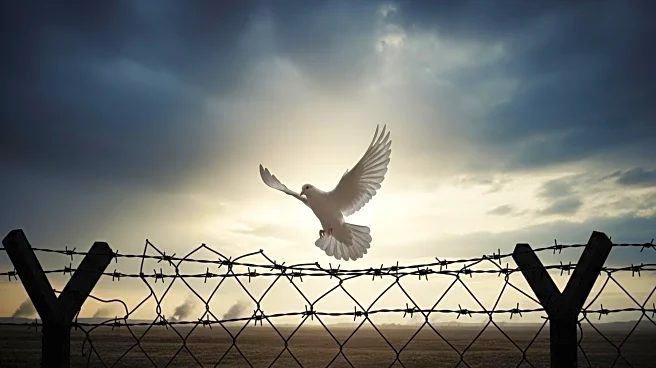What's Happening?
The ongoing conflict in Libya has resulted in significant challenges for refugees fleeing the violence. According to UNICEF, these individuals face numerous dangers during their journey, including the risk of drowning during sea crossings, malnourishment, dehydration, trafficking, kidnapping, and rape. Additionally, upon reaching countries they travel through or their final destinations, refugees often encounter xenophobia and discrimination. The situation in Libya remains dire, with many refugees seeking safety and stability in other regions, despite the perilous conditions they must endure.
Why It's Important?
The plight of refugees fleeing the Libyan conflict underscores the broader humanitarian crisis affecting the region. The dangers faced by these individuals highlight the urgent need for international intervention and support. The risks of trafficking and exploitation are particularly concerning, as they can lead to long-term trauma and instability for affected individuals. Furthermore, the discrimination and xenophobia encountered by refugees in host countries can exacerbate their vulnerability, making it difficult for them to integrate and access necessary resources. Addressing these issues is crucial for ensuring the safety and well-being of refugees and promoting global human rights.
What's Next?
International organizations and governments may need to increase their efforts to provide safe passage and support for refugees fleeing Libya. This could involve enhancing rescue operations at sea, providing humanitarian aid, and implementing policies that protect refugees from exploitation and discrimination. Additionally, diplomatic efforts to stabilize the situation in Libya could help reduce the number of individuals forced to flee. Collaboration between countries and organizations is essential to address the root causes of the conflict and improve conditions for refugees.
Beyond the Headlines
The ongoing refugee crisis in Libya raises important ethical and legal questions about the responsibilities of nations to protect vulnerable populations. The challenges faced by refugees highlight the need for comprehensive international policies that prioritize human rights and provide equitable support for those in need. Long-term solutions must consider the cultural and societal impacts of displacement, ensuring that refugees can rebuild their lives with dignity and security.










